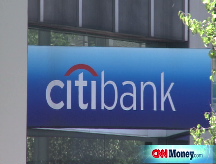Treasurys fall as supply builds
Prices for government debt dip with a record auction, including $22 billion of 7-year notes.
NEW YORK (CNNMoney.com) -- Treasurys fell Thursday as the government auctioned off a record amount of debt this week and President Barack Obama outlined a budget that called for more spending.
The Treasury Department auctioned $22 billion in 7-year notes as part of a record $94 billion debt offering over three days. The market absorbed $32 billion of 5-year notes Wednesday and $40 billion in 2-year bills Tuesday.
The auctions come as federal spending explodes. The government is set to pay $787 billion for stimulus, $700 billion for the bank bailout and trillions more in various liquidity programs.
Meanwhile, the budget Obama unveiled for fiscal 2010 projects a deficit of $1.75 trillion. It also included provisions for up to $250 billion in additional aid for the banking system.
Obama has pledged to reduce the deficit he inherited to $533 billion by 2013.
"Supply concerns continue to weigh on the market," said Peter Cardillo, chief market strategist at Avalon Partners in New York.
Thursday's retreat comes despite a raft of bad economic news.
New home sales plunged to an all-time low in January and the number of Americans filing new claims for unemployment hit a 26-year high last week.
Separately, ailing automaker GM reported a $9.6 billion loss in the fourth quarter, highlighting the challenges facing the nation's auto industry.
Bad economic news typically drives Treasury prices higher, as investors flock to the safety of government debt. But the flood of supply outweighed safe-haven demand.
Bond prices: The benchmark 10-year note fell 14/32 to 98 1/32 and its yield rose to 2.98% from 2.95% on Wednesday. Bond prices and yields move in opposite directions.
The 5-year note was lower, yielding 2.08%, higher than the 1.98% awarded at Wednesday's auction.
The 30-year bond was down 1-2/32 at 97 10/32, and its yield rose to 3.65%.
The yield on the 3-month note stood at 0.27%, down from 0.3% on Wednesday's level. Demand for the shorter term note is seen as a gauge of investor confidence.
Lending rates: The 3-month Libor rate was unchanged from Wednesday at 1.26%, and the overnight Libor rate rose to 0.28% from 0.27%, according to Bloomberg.com.
Libor, the London Interbank Offered Rate, is a daily average of rates that 16 banks charge each other to lend money in London.
Two credit market gauges suggested market conditions were improving. The TED spread fell to 0.96 percentage point, down slightly from 0.97 on Wednesday. The larger the TED spread, the less willing investors are to take risks.
The Libor-OIS spread sank to 1.01 percentage points from 1.02 points Wednesday. The smaller the spread, the more cash is available for banks to lend. ![]()


